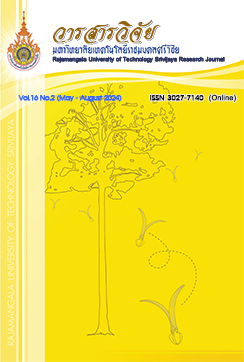An Analysis of Biological Active Compounds, Nutrients and Microorganisms of Thai Shortbread Cookies Supplemented by Grinded Medium Roasted Robusta Coffee
Keywords:
Thai Shortbread Cookie, Roasted Robusta Coffee, antioxidants, total phenolic compounds, active compoundsAbstract
The addition of ground medium-roasted Robusta coffee at 3 different levels: 1.8%, 3.6% and 5.4% to Thai Shortbread cookie found that the inclusion of 5.4% Robusta coffee received the highest preference score from 40 panelists compared to the addition of 1.8% and 3.6% (P < 0.05). The nutritional analysis showed increases in protein, several minerals (Calcium, Phosphorus, Potassium, Magnesium, Iron, Zinc, Aluminum and Manganese), and 3 times increases in fiber. The biologically active compounds including antioxidant and total phenolic compounds were increased by 4-8 times and 16 times, respectively. In accordance with the Thai Community Product Standard 118/2555, the food microbial analysis, including Coliform Bacteria, Staphylococcus aureus, Escherichia coli, Yeast and Mold, and Total Plate Count, was investigated on days 0 and 90 presenting at < 3.0 MPN/g, < 1.0 ´ 10 CFU/g, < 3.0 MPN/g, < 10 ESPC/g and < 25 ´ 10 CFU/g, respectively. They remained consistent during the storage in closed PP plastic bag at room temperature (25 oC).
References
AOAC. 1990. Oil and Fats, pp. 951-986. In Helrich, K., eds. Official methods of analysis of the association of official analytical chemists. Association of Official Analytical Chemists, USA.
Ainsworth, E.A. and Gillespie, K.M. 2007. Estimation of total phenolic content and other oxidation substrates in plant tissues using Folin-ciocalteu reagent. Nature Protocols 2(4): 875-877.
Alamri, E., Rozan, M. and Bayomy, H. 2022. A study of chemical composition, antioxidants, and volatile compounds in roasted Arabic coffee. Saudi Journal of Biological Sciences 29: 3133-3139.
Castillo, M., Iriondo-DeHond, A., Fernández-Gómez, B., Martínez Sáez, N., Rebollo-Hernanz, M., Martín-Cabrejas, M.A. and Farah, A. 2019. Coffee antioxidants in chronic diseases, pp. 20-56. In Farah, A., eds. Coffee: Consumption and Health Implications. Royal Society of Chemistry, UK.
Diaz-Rubio, M.E. and Saura-calixto, F. 2007. Dietary fiber in brewed coffee. Journal of Agricultural and Food Chemistry 55(5): 1999-2003.
de Melo Pereira, G.V., de Carvalho Neto, D.P., Magalhães Júnior, A.I., do Prado, F.G., Pagnoncelli, M., Karp, S.G. and Soccol, C.R. 2020. Chemical composition and health properties of coffee and coffee by products. Advances in Food and Nutrition Research 91: 65-96.
European Food Safety Authority. 2010. Scientific Opinion on Dietary Reference Values for carbohydrates anddietary fibre. EFSA Journal 8(3): 1-77.
Franca, A.S. and Oliveira, L.S. 2022. Potential uses of spent coffee grounds in the food industry. Foods 11(14): 2064-2083.
Food and Drug Administration (FDA). 2022. Bacteriological analytical manual (BAM). Available Source: https://www. fda.gov/food/laboratory-methods-food/bacteriological-analytical-manual-bam, September 06, 2022.
Gulcin, I. 2012. Antioxidant activity of food constituents: an overview. Archives of Toxicology 86: 345-391.
Hasbullah, U. and Umiyati, R. 2021. Antioxidant activity and total phenolic compounds of Arabica and Robusta coffee at different roasting levels. Journal of Physics 1764(1): 012033.
Inprasit, C. and Gutlee, P. 2014. A small scale coffee bean roaster that preserves coffee quality by pressure regulation. Journal of Science and Technology Kasetsart University 3(3): 64-77. (in Thai)
Janda, K., Jakubczyk, K., Baranowska-Bosiacka, I., Kapczuk, P., Kochman, J., Re ̨bacz-Maron, E. and Gutowska, P. 2020. Mineral composition and antioxidant potential of coffee beverages depending on the brewing method. Foods 9: 121-137.
Kreicbergs, V., Dimins, F., Mikelsone, V. and Cinkmanis, I. 2011. Biologically active compounds in roasted coffee, pp. 110-115. In The 6th Baltic Conference on Food Science and Technology “Innovations for Food Science and Production” Foodbalt. Jelgava, Latvia.
Lee, S.C. and Prosky, L. 1995. International survey on dietary fiber definition, analysis, and reference materials. Journal of AOAC International 78(1): 22-36.
Monteiro, M., Santos, R.A., Iglesias, P., Couto, A., Serra, C.R., Gouvinhas, I., Barros, A., Oliva-Teles, A., Enes, P. and Díaz-Rosales, P. 2020. Effect of extraction method and solvent system on the phenolic content and antioxidant activity of selected macro-and microalgae extracts. Journal of Applied Phycology 32: 349-362.
Munyendo, L.M., Njoroge, D.M., Owaga, E.E. and Mugendi, B. 2021. Coffee phytochemicals and post-harvest handling a complex and delicate balance. Journal of Food Composition and Analysis 102: 103995
Noonium, T. and Wongsudarak, W. 2014. Utilization of Sang-yod rice flour in Thai shortbread cookies product, pp. 977-985. In The 6th SKRU National Conference: Focus on Education and Culture for Community Development. Songkhla Rajabhat University, Songkhla. (in Thai)
Prince of Songkhla University. 2006. Manuals of OTOP development. iPrintOut, Pang Nga. (in Thai)
Phugan, P. 2021. Effects of coffee peel powder supplementation on qualities of cake. Phranakhon Rajabhat Research Journal (Science and Technology) 16(1): 75-85.
Suphan, P. and Kongjaroon, C. 2021. Antioxidation capacity of cold brew coffee, pp. 1112-1119. In The 2nd Faculty of Science and Technology, Maejo University: Science Technology and Innovation. Chaing Mai. (in Thai)
Suweero, K., Thimayong, D., Rimkeeree, H. and Depanya, W. 2021. Development of gluten free Thai cookie “Kleeb Lum Duan” powder. Journal of Engineering, RMUTT 18(2): 23-34.
U.S. Department of Agriculture. 2019. Vegetables, mixed, frozen, cooked, boiled, drained, without salt. USDA Agricultural Research Service. Available Source: https://fdc.nal. usda. gov/fdc-app.html#/food-details/170472/nutrients, January 31, 2023.
Vignoli, J.A., Viegas, M.C., Bassoli, D.G. and Benassi, M.T. 2014. Roasting process affects differently the bioactive compounds and the antioxidant activity of arabica and robusta coffees. Food Research International 61: 279-285.
Yanagimoto, K., Ochi, H., Lee, K.G. and Shibamoto, T. 2004. Antioxidative activities of fractions obtained from brewed coffee. Journal of Agricultural and Food Chemistry 52(3): 592-596.
Yani, A. and Novitasari, E. 2022. Quality evaluation of robusta coffee bean from four superior clones with semi-wet processing in lampung province. IOP Conference Series: Earth and Environmental Science 1024: 012028.
Downloads
Published
How to Cite
Issue
Section
License
Copyright (c) 2024 Rajamangala University of Technology Srivijaya Research Journal

This work is licensed under a Creative Commons Attribution-NonCommercial-NoDerivatives 4.0 International License.
The content and information in the article published in Journal of Rajamangala University of Technology Srivijaya It is the opinion and responsibility of the author of the article. The editorial journals do not need to agree. Or share any responsibility.







